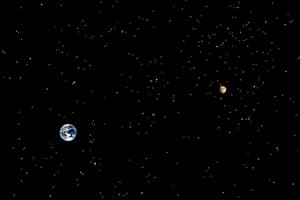Podcast
Questions and Answers
What is the definition of a celestial object?
What is the definition of a celestial object?
- Any object found in outer space (correct)
- Any object that orbits a planet
- Any object located on Earth
- Any object that emits light
Which statements about the Sun are true?
Which statements about the Sun are true?
- The Sun emits very little energy compared to other stars.
- The Sun is located 1.5 x $10^{8}$ km away from Earth. (correct)
- The Sun is the largest star in the universe.
- The Sun is almost 340,000 times more massive than Earth. (correct)
Which of the following correctly describes the planets in our Solar System?
Which of the following correctly describes the planets in our Solar System?
- The four terrestrial planets have rocky surfaces. (correct)
- There are ten planets in our Solar System.
- All planets are luminous celestial bodies.
- All planets are composed of both gases and solids.
What distinguishes gas giants from terrestrial planets?
What distinguishes gas giants from terrestrial planets?
How can you express the number 340,000 in scientific notation?
How can you express the number 340,000 in scientific notation?
What is the primary composition of a galaxy?
What is the primary composition of a galaxy?
How many stars are estimated to be in the Milky Way galaxy?
How many stars are estimated to be in the Milky Way galaxy?
What is the appearance of the Milky Way when viewed from Earth?
What is the appearance of the Milky Way when viewed from Earth?
What scientific study encompasses the study of celestial objects beyond Earth?
What scientific study encompasses the study of celestial objects beyond Earth?
What tool do astronomers primarily use to study galaxies?
What tool do astronomers primarily use to study galaxies?
Which of the following is not part of the Universe?
Which of the following is not part of the Universe?
What should you cover the end of a flashlight with during astronomical observations?
What should you cover the end of a flashlight with during astronomical observations?
What does an observer need to record when sketching celestial objects?
What does an observer need to record when sketching celestial objects?
Which of the following statements is true about planets in our solar system?
Which of the following statements is true about planets in our solar system?
What distinguishes terrestrial planets from gas giants?
What distinguishes terrestrial planets from gas giants?
Which planet is known to have no moons?
Which planet is known to have no moons?
What is the approximate distance from Earth to the Moon?
What is the approximate distance from Earth to the Moon?
Which statement correctly describes the Milky Way?
Which statement correctly describes the Milky Way?
Why can planets be seen from Earth despite being non-luminous?
Why can planets be seen from Earth despite being non-luminous?
Which planet is the closest to the Sun?
Which planet is the closest to the Sun?
What is the primary focus of astronomy?
What is the primary focus of astronomy?
How many natural satellites does Earth have?
How many natural satellites does Earth have?
Why does the Moon appear visible in the night sky?
Why does the Moon appear visible in the night sky?
What distinguishes planets from stars?
What distinguishes planets from stars?
What is a natural satellite according to astronomers?
What is a natural satellite according to astronomers?
Which of the following correctly describes a galaxy?
Which of the following correctly describes a galaxy?
What is the best example of a gas giant?
What is the best example of a gas giant?
How are terrestrial planets different from gas giants?
How are terrestrial planets different from gas giants?
What term do astronomers use to describe a path of an object as it moves around another object in space?
What term do astronomers use to describe a path of an object as it moves around another object in space?
Flashcards
Galaxies
Galaxies
Huge collections of stars, gas, dust, and planets bound together by gravity.
Milky Way Galaxy
Milky Way Galaxy
Our home galaxy, containing over 200 billion stars, including our Sun.
Astronomy
Astronomy
The study of celestial objects beyond Earth, such as stars, planets, and moons.
Natural Satellites
Natural Satellites
Signup and view all the flashcards
Horizon Diagram
Horizon Diagram
Signup and view all the flashcards
What is Astronomy?
What is Astronomy?
Signup and view all the flashcards
What is a celestial object?
What is a celestial object?
Signup and view all the flashcards
What is the Universe?
What is the Universe?
Signup and view all the flashcards
What is a star?
What is a star?
Signup and view all the flashcards
What is a planet?
What is a planet?
Signup and view all the flashcards
Stars
Stars
Signup and view all the flashcards
Planets
Planets
Signup and view all the flashcards
Solar system
Solar system
Signup and view all the flashcards
Moon
Moon
Signup and view all the flashcards
Galaxy
Galaxy
Signup and view all the flashcards
Universe
Universe
Signup and view all the flashcards
Orbit
Orbit
Signup and view all the flashcards
Terrestrial Planet
Terrestrial Planet
Signup and view all the flashcards
Gas Giant
Gas Giant
Signup and view all the flashcards
Satellite
Satellite
Signup and view all the flashcards
Earth
Earth
Signup and view all the flashcards
The Moon
The Moon
Signup and view all the flashcards
Study Notes
Astronomy
- Astronomy is the study of objects beyond Earth, including stars, planets, and moons.
- Galaxies are huge collections of stars, gas, dust, and planets.
- The Milky Way is a galaxy containing more than 200 billion stars. It also contains other celestial objects.
- Astronomers and scientists continue to study stars, planets, galaxies, and other celestial objects to learn about the Universe.
Celestial Objects
- Celestial objects are studied to learn more about the Universe and our place in space.
- Stars are luminous objects that produce and emit light.
- Planets are non-luminous objects that do not produce their own light, but reflect light from other sources.
- Planets orbit stars and are seen because they reflect light from the sun.
- Moons are satellites that orbit planets.
The Solar System
- The Sun is a star in our Solar System.
- The eight planets in our Solar System orbit the Sun.
- Planets in our Solar System include planets that are composed of rocky and gaseous surfaces and liquids.
- Natural satellites/moons orbit some planets in our Solar System.
The Universe
- The Universe consists of everything that exists.
- Within the Universe there are galaxies.
- Each galaxy contains billions of stars and other celestial objects.
Studying That Suits You
Use AI to generate personalized quizzes and flashcards to suit your learning preferences.




